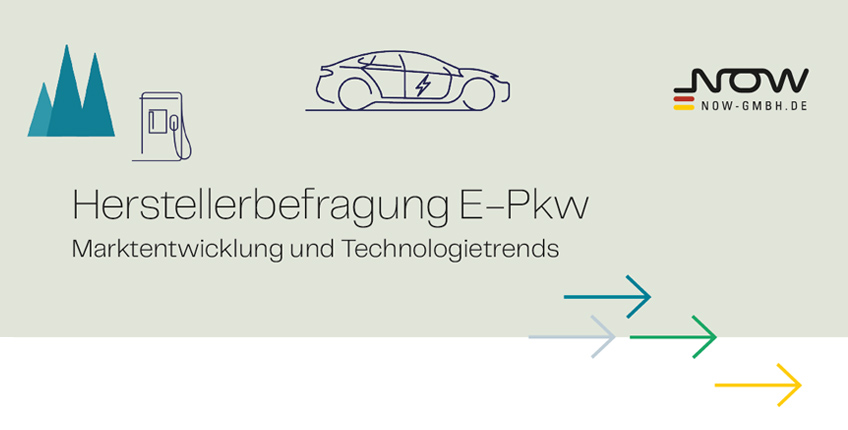NOW publishes factsheet on market development from a manufacturer’s perspective.
In 2021, the German government set itself the goal of making Germany the leading market for electric mobility with 15 million electric cars by 2030. Establishing charging infrastructure ahead of time is a key success factor here, as is data-based demand planning. The “Manufacturer survey of electric passenger cars: market development and technology trends” (“Herstellerbefragung E-Pkw: Marktentwicklung und Technologietrends”) factsheet published today by NOW GmbH provides essential assessments and forecasts for this planning.
In the period from December 2022 to January 2023, the National Centre for Charging Infrastructure within NOW GmbH conducted a confidential survey of vehicle manufacturers for the factsheet in accordance with antitrust law and used it to forecast vehicle specifics relevant to planning, such as charging capacity, battery size and energy consumption, in addition to the ramp-up figures. This survey was conducted on behalf of the Federal Ministry for Digital and Transport (BMDV – Bundesministerium für Digital and Transport) in order to record updated plans regarding the manufacturers’ sales figures and further technological advances. The manufacturers participating in the current survey represented around 80 per cent of the passenger car market in Germany.
Based on the data provided, the market development in terms of sales and stock figures for electric cars (including plug-in hybrids, PHEVs) was modelled. In addition, statements regarding the development of battery capacity as well as the energy consumption of fully electric cars could be made. The most important findings with regard to the development up to 2030:
- Based on the manufacturers’ sales figures, there will be a total of 16.6 million e-cars (BEV & PHEV) in 2030, of which 13.4 million will be fully electric cars. This would correspond to 34 per cent of all registered passenger cars.
- According to the manufacturers, the forecast development of battery capacity will increase to an average of 73 to 97 kWh by 2030, an increase of 25% compared to 2023.
- The predicted energy consumption of BEVs will fall to between 13.0 and 16.5 kWh per 100 kilometres by 2030.
Kurt-Christoph von Knobelsdorff, CEO and spokesperson for NOW GmbH: “The results of the manufacturer survey show that the ambitious political target of 15 million electric cars by 2030 is achievable. Even more important, however, is the significance of the information from the manufacturer survey for planning the future demand for charging infrastructure.”
Accordingly, the manufacturers’ information will provide an important foundation of data for the forthcoming new edition of the “Charging infrastructure after 2025/2030: Scenarios for the market ramp-up” study.

